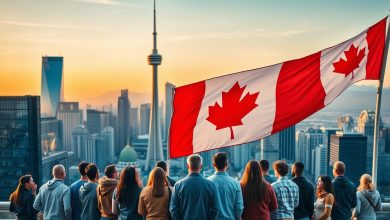UK Horizons: Revealing the Benefits and Opportunities of Visa Sponsorship and Marriage Visas
For American nationals looking to reunite with their British partners, the spouse visa offers a clear pathway.
This option allows couples to live together while enjoying work and study privileges without needing employer support.
The process involves meeting specific financial requirements and proving a genuine relationship. With an initial validity of 30-33 months, extensions lead to indefinite leave to remain. After five years, citizenship becomes an achievable goal.
Compared to other immigration routes, this choice provides more flexibility. Applicants must submit thorough documentation to avoid common refusal reasons. Legal guidance often helps navigate complex requirements efficiently.
Understanding UK Marriage and Partner Visas
Couples seeking to build a life together in Britain often explore the spouse visa route. This option legally recognizes relationships, allowing partners to reside in the UK. Key differences exist between marriage visas and fiancé or civil partnership routes.
What Is a UK Spouse Visa?
Under Appendix FM of UK Immigration Rules, a spouse visa permits partners of British citizens or settled residents to live in the country. Initial grants last 30–33 months, depending on application location.
| Application Type | Validity Period |
|---|---|
| Overseas applicants | 33 months |
| UK applicants | 30 months |
Eligible Sponsors: Who Can Apply?
Sponsors must meet specific criteria:
- British citizens or individuals with indefinite leave to remain (ILR)
- EU nationals holding pre-settled status
- Refugees under humanitarian protection
Armed Forces personnel benefit from a reduced income threshold of £23,496. Turkish nationals and EU settlement scheme participants may qualify under special arrangements.
Minimum age requirements vary: 18+ in England/Wales, 16+ in Scotland/Northern Ireland. Overseas marriages require UKVI verification to ensure compliance with UK law.
Key Benefits of a UK Spouse Visa
Living in Britain with a partner becomes simpler with the spouse visa benefits. This route offers stability and opportunities for couples aiming to live together long-term.
Right to Work and Live Freely
Holders enjoy full labor market access, unlike restrictive fiancé visas. Employers need not sponsor jobs, and there’s no minimum salary requirement.
Additional perks include:
- NHS coverage after paying the £1,035/year Immigration Health Surcharge
- State school access and home-fee university status for children
- Travel flexibility within the visa’s 30–33 month validity
“The spouse visa removes barriers to employment, allowing partners to contribute immediately to the economy.”
Pathway to Indefinite Leave to Remain (ILR)
After five continuous years, applicants qualify for indefinite leave to remain. This permanent status requires passing the Life in the UK test and meeting residency rules.
Twelve months post-ILR, british citizenship becomes attainable. Dependent children also benefit from streamlined family reunion processes.
Eligibility Requirements for a UK Marriage Visa
Meeting eligibility criteria is the first step for couples planning to relocate together. Authorities verify both personal and legal aspects to ensure compliance with immigration rules.
Age and Relationship Status
Partners must be at least 18 in England or Wales, or 16 in Scotland and Northern Ireland. Unmarried couples need proof of genuine relationship, like two years of cohabitation or shared financial ties.
Cultural exemptions exist for couples unable to live together before marriage. However, UKVI interviews may validate the relationship’s authenticity through detailed questioning.
Legal Recognition of Marriage
Overseas unions require notarized certificates and UKVI approval. Prohibited degrees of kinship (e.g., siblings) automatically disqualify applicants.
Previously divorced individuals must submit decree absolute documents. Civil partnerships can convert to marriages, simplifying the process for some couples.
“Legal recognition hinges on thorough documentation—missing papers delay approvals.”
Penalties apply for undisclosed separations or fraudulent claims. Proper notarization of international documents avoids processing setbacks.
Financial Requirements for Visa Sponsorship
Financial stability plays a crucial role in securing approval for partner visas. Sponsors must prove they can support their partner without relying on public funds. The rules focus on income, savings, or a mix of both.
Minimum Income Threshold (£29,000)
The sponsor’s earnings must meet or exceed £29,000 annually. This minimum income ensures couples can live independently. Acceptable sources include:
- Employment or self-employment
- Pensions or rental income
- Armed Forces salaries (calculated differently)
| Income Source | Proof Required |
|---|---|
| Employment | 6 months of payslips |
| Savings | £88,500 held for 6+ months |
Using Savings to Meet the Requirement
Cash savings of £88,500 can replace the financial requirement. Funds must be accessible and held for at least six months. Combined income streams are allowed with proper documentation.
“Savings provide flexibility for sponsors without steady earnings.”
Transitional Arrangements for Pre-2024 Applicants
Applications submitted before April 2024 follow the £18,600 threshold. Extensions and renewals retain this lower benchmark. New rules apply only to first-time applicants after the cutoff.
Child dependents of British nationals are exempt from additional income least calculations. Benefit claimants must prove adequate maintenance instead.
Proving a Genuine and Subsisting Relationship
To successfully apply, couples must demonstrate their commitment through documented proof. Authorities scrutinize applications to ensure partnerships are authentic and long-term. Submitting outdated or insufficient materials risks delays or rejections.
Evidence of Cohabitation
Documents showing partners live together strengthen applications. Government-issued correspondence (e.g., utility bills, leases) must be dated within four years. Key items include:
- Joint tenancy agreements with both names
- Matching addresses on bank statements or tax filings
- Insurance policies listing each other as beneficiaries
“Consistency across documents is critical—mismatched dates or addresses raise red flags.”
Shared Financial Responsibilities
Financial ties provide evidence of a genuine relationship. Couples should highlight:
- Joint savings or credit accounts
- Shared household expense records
- Travel receipts showing trips taken together
Documentation for Long-Distance Couples
Partners living apart must submit additional proof of ongoing contact. Acceptable materials include:
- Dated photos from visits over the past two years
- Call logs or chat histories (minimum six months)
- Notarized letters from friends/family confirming the relationship
Cultural or religious barriers to cohabitation require explanatory affidavits.
English Language Requirements
Applicants must demonstrate basic English skills to qualify for certain immigration routes. The UK mandates proof of proficiency to ensure smooth integration. Tests or exemptions validate this requirement.
Approved Tests and Exemptions
Only tests from SELT providers like Trinity College London or IELTS are accepted. Results must meet CEFR A1 for initial applications. Higher A2 levels apply for extensions.
| Test Type | Validity Period |
|---|---|
| SELT (A1/A2) | 2 years |
| Non-SELT (Notarized) | Case-by-case review |
Exemptions include:
- Degrees taught in English (verified by UK NARIC)
- Medical conditions with certified proof
- Age 65+ applicants
“Retaking expired tests delays processing—plan ahead to avoid setbacks.”
CEFR A1 Level Proficiency
Basic english language skills cover speaking and listening. Test centers assess:
- Simple conversations (e.g., greetings, directions)
- Understanding everyday phrases
Country-specific waivers apply to nationals from majority-English-speaking regions. Combined scores from multiple attempts are invalid.
Step-by-Step Application Process
Navigating the visa application process requires careful attention to each step. Missing details or incorrect submissions may delay approval. Following the Home Office guidelines ensures smoother processing.
Completing the Online Form
Create a UKVI account to access the application portal. The form asks for personal details, travel history, and sponsor information. Double-check entries to avoid errors.
Required documents must be scanned in PDF or JPEG format. Save drafts frequently—timeouts may erase unsaved progress. Review all sections before final submission.
Paying Fees and Immigration Health Surcharge
Costs vary by location:
- Overseas applicants: £1,846
- In-country applicants: £1,258
The Immigration Health Surcharge (IHS) is £1,035 annually. Use the IHS calculator to determine the exact amount. Refunds are possible if the application is denied or withdrawn.
“Payment verification takes 48 hours—submit receipts immediately to avoid delays.”
Booking a Biometrics Appointment
After submission, schedule an appointment at a Visa Application Centre (VAC). The standard biometric fee is £19.20. Premium slots cost extra but offer faster processing.
Bring original documents to the appointment. Late arrivals may require rescheduling. Track progress via the Home Office portal using your reference number.
Required Supporting Documents
Gathering the right paperwork is essential for a smooth spouse visa application. Missing or incorrect materials often lead to delays or rejections. The Home Office requires thorough documentation to verify eligibility.
Proof of Relationship
Couples must provide concrete evidence of a genuine partnership. Acceptable documents include:
- Marriage or civil partnership certificates (translated if not in English)
- Two years of joint bills or leases showing cohabitation
- Dated photos and travel itineraries from visits
High-risk countries require TB test results. Notarized affidavits from friends or family can supplement long-distance cases.
“Inconsistent dates or mismatched names trigger additional scrutiny—double-check everything.”
Financial Evidence
Sponsors must prove they meet the £29,000 income threshold. Key documents:
- Six months of payslips with employer verification letters
- Bank statements showing £88,500 savings (held for 6+ months)
- Tax returns cross-referenced with HMRC records
Digital copies must meet UKVI formatting rules. Certified translations are mandatory for non-English statements.
Accommodation Details
Applicants must demonstrate adequate housing. Submit:
- A property inspection report to rule out overcrowding
- Mortgage statements or rental agreements in the sponsor’s name
- Utility bills confirming occupancy
Statutory declarations from landlords are required for shared residences. Dependent children need birth certificates and custody papers.
UK Spouse Visa Fees and Costs
Costs vary significantly depending on application location and processing speed. Budgeting for these expenses ensures no surprises during the immigration process.
Application Fees (Inside vs. Outside the UK)
Fees differ based on where you apply:
- Outside the UK: £1,846
- Inside the UK: £1,258
The Immigration Health Surcharge (IHS) adds £2,587.50 for 2.5 years. This covers NHS access during the visa period.
Priority Processing Options
Expedited services reduce waiting times:
- Super priority service: £1,000 for 1-day processing
- Priority service: £500 for 5-day turnaround
“Expedited processing benefits those with urgent travel plans but requires precise documentation.”
Additional considerations:
- Fee waivers apply for extreme financial hardship cases
- Currency conversion rates affect payments made overseas
- Refunds are issued only for refused or withdrawn applications
Dependents pay separate fees. Payment plans are unavailable—full amounts must be paid upfront. Always save payment receipts for future reference.
Processing Times and What to Expect
Understanding the timeline helps applicants plan their relocation efficiently. The home office follows structured review periods, but external factors may influence outcomes. Preparation reduces uncertainty during this phase.
Standard vs. Priority Timelines
Applications submitted outside the UK typically take 12 weeks. Those filed within the country resolve faster, averaging 8 weeks. Expedited options shorten waits significantly.
| Service Type | Duration |
|---|---|
| Standard (Overseas) | 3 months |
| Standard (UK-Based) | 2 months |
| Priority | 5–10 business days |
Peak seasons (summer, holidays) slow responses. Submitting early avoids bottlenecks. The home office prioritizes complete applications with frontloaded evidence.
Delays and How to Avoid Them
Common setbacks include missing documents or unclear financial proofs. Use the checklist below to streamline submissions:
- Verify all forms are signed and dated.
- Ensure translations are certified.
- Confirm biometric reuse eligibility to skip appointments.
“MP escalation works for cases exceeding 6 months—contact your representative with the GWF number.”
Email notifications track progress. Avoid travel until approval to prevent complications. COVID-19 backlogs occasionally extend waits, but most cases now follow standard processing time.
What Happens After Approval?
After receiving approval, applicants must complete several key steps to finalize their UK relocation. These tasks ensure legal compliance and access to essential services. Timeliness is critical to avoid complications.
Collecting Your Biometric Residence Permit
The Biometric Residence Permit (BRP) serves as proof of leave remain status. It must be collected within 10 days of arrival. Designated post offices or universities handle distributions.
Errors like misspelled names require a £154 correction fee. Police registration is mandatory for nationals from certain countries. Delays risk fines or restricted access to services.
Entering the UK Within 30 Days
The entry vignette in your passport is valid for 30 days. Miss this window, and a £154 transfer fee applies. Border officers may verify accommodation details or financial means.
Post-entry priorities include:
- Registering with a GP for NHS access (2–3 week processing)
- Opening a bank account using the BRP and proof of address
- Converting foreign driving licenses within 12 months
“Council tax registration and school enrollments often require the BRP—delay these tasks, and penalties follow.”
Employers conduct right-to-work checks via the BRP. Keep scanned copies for rental agreements or utilities. These steps solidify your spouse partner residency rights efficiently.
Extending Your UK Spouse Visa
Renewing a UK spouse visa requires careful planning to meet strict Home Office deadlines. Applicants must prove ongoing eligibility while avoiding gaps in residency. Missing key steps risks delays or refusal.
Timing and Eligibility for Renewal
Applications can be submitted 28 days before the current visa expires. Continuous residence is critical—absences exceeding 180 years disrupt eligibility for indefinite leave.
Required documents include:
- Updated cohabitation proofs (joint bills, leases)
- Recent payslips meeting the £29,000 threshold
- Valid Life in the UK test results (for ILR applicants)
“Extensions demand precision—even minor errors trigger additional scrutiny.”
Preparing for ILR Application
After five years, partners qualify for indefinite leave to remain. Key preparations:
- Pass the Life in the UK test (75% score minimum)
- Show English proficiency at CEFR A2 level
- Provide criminal record checks from all countries lived in
| Requirement | Details |
|---|---|
| Residency | No single absence >180 days |
| Financial | £29,000 income or £88,500 savings |
Dependents must be included in the application. Review immigration history for inconsistencies before submission.
Common Reasons for Visa Refusal
Many applicants face unexpected rejections due to avoidable mistakes. Understanding these pitfalls helps streamline the process. The home office maintains strict standards, and minor oversights often lead to denials.
Insufficient Financial Proof
Nearly 42% of refusals stem from financial documentation issues. Sponsors must meet the £29,000 threshold with verifiable evidence. Common errors include:
- Projecting future income instead of showing current earnings
- Failing to maintain savings for the required six-month period
- Not accounting for currency exchange rate fluctuations
| Mistake | Solution |
|---|---|
| Unverified payslips | Include employer letters confirming authenticity |
| Joint accounts with low balances | Highlight individual savings meeting requirements |
“The home office rejects applications when financial proofs appear unstable or temporary.”
Lack of Genuine Relationship Evidence
Officials scrutinize relationship authenticity thoroughly. Insufficient proof accounts for 30% of refusals. Key weaknesses include:
- No shared residential history or financial ties
- Minimal communication records for long-distance couples
- Inconsistent details across submitted documents
Cultural differences require special documentation. Affidavits explaining non-cohabitation traditions help avoid misunderstandings.
Errors in Documentation
Technical mistakes delay or derail applications. The most frequent issues involve:
- Using outdated application forms
- Missing signatures on critical pages
- Uncertified translations of foreign documents
Address history gaps raise red flags. Applicants must account for all residences in the past decade. Overlooking dependent fees also triggers automatic rejections.
“Previous immigration violations must be disclosed—even minor infractions affect current requirements.”
Appealing a Refused Application
When a visa application faces refusal, understanding appeal options becomes critical. Applicants have 28 days to contest the decision through formal channels. Strategic choices between reapplying or appealing depend on refusal reasons and available evidence.
Grounds for Appeal
The home office may reverse decisions if procedural errors or human rights violations exist. Valid grounds include:
- Article 8 claims (right to family life)
- Incorrect income calculations by caseworkers
- New evidence proving relationship authenticity
“First-tier tribunals review 43% of refused cases—preparing detailed submissions increases success rates.”
Administrative reviews cost £80 for in-country applications. Judicial reviews address legal misinterpretations but require £506 fees. Legal representation improves outcomes for complex cases.
Reapplying with Stronger Evidence
A fresh visa application often succeeds when refusal reasons are addressable. Key steps:
- Analyze refusal letters to identify weak points
- Gather additional financial or relationship proofs
- Correct technical errors like unsigned forms
The home office permits immediate reapplication unless fraud is alleged. Cooling-off periods are myths—timely submissions prevent residency gaps.
| Strategy | Timeframe |
|---|---|
| Appeal | 6–12 months |
| Reapplication | 4–8 weeks |
Applicants must apply for fee waivers if financial hardship exists. Caseworkers prioritize complete packages over partial corrections.
Rights and Responsibilities of Visa Holders
Understanding rights and obligations helps visa holders navigate life in Britain smoothly. While privileges like work and healthcare access are granted, certain restrictions apply. Compliance ensures long-term stability under UK immigration rules.
Working and Studying in the UK
Spouse visa holders enjoy full employment rights without employer sponsorship. Self-employment is permitted but requires registering with HMRC. Business startups must adhere to local licensing laws.
Educational opportunities include:
- Postgraduate studies at home-fee rates after one year of residency
- Tier 4 student visa conversions for degree programs
- ESOL courses to meet language requirements for ILR
“Visa holders contribute significantly to the UK economy—flexible work policies benefit both individuals and industries.”
Access to Public Funds
Most visa holders cannot claim public funds like Universal Credit or housing assistance. Exceptions apply to british citizen dependents or refugees. The NHS surcharge (£1,035/year) replaces entitlement-based healthcare access.
Additional limitations:
- No voting rights in general elections (local elections permitted for some nationalities)
- Exemption from jury service during temporary residency
- Pension contributions allowed but no state pension without ILR
Settled person status unlocks broader benefits after five years. EU scheme participants retain pre-Brexit entitlements if applied before deadlines.
Conclusion
The journey toward permanent settlement involves multiple steps over five years. Meeting financial and relationship requirements ensures smooth progress.
Professional legal support helps navigate complex rules. Post-Brexit adjustments may affect future applications, so staying informed is critical.
Dual citizenship offers added flexibility for families. Success rates improve with thorough documentation and timely renewals.
Always verify deadlines and policy updates. Resources like the Home Office portal track application statuses efficiently.
For more information explore the official visa website mentioned in this article:
You will be redirected to another website
FAQ
What is a UK spouse visa?
A UK spouse visa allows a foreign national to live with their British or settled partner in the UK. It grants the right to work, study, and eventually apply for indefinite leave to remain.
Who can sponsor a marriage visa in the UK?
A sponsor must be a British citizen, have settled status, or hold refugee or humanitarian protection leave. They must meet the financial requirement and provide suitable accommodation.
What are the financial requirements for a UK spouse visa?
The sponsor must earn at least £29,000 annually or show equivalent savings. Savings above £16,000 can be used to meet the threshold if held for at least six months.
How can couples prove their relationship is genuine?
Evidence includes joint bills, shared bank accounts, photos, travel records, and communication logs. Long-distance couples should provide proof of visits and future plans.
What English language test is required for a spouse visa?
Applicants must pass an approved CEFR A1 level test. Exemptions apply for nationals of English-speaking countries or those with certain academic qualifications.
How long does the spouse visa application take?
Standard processing takes up to 12 weeks outside the UK or 8 weeks inside. Priority services reduce this to 5-10 working days for an additional fee.
Can a spouse visa lead to British citizenship?
Yes, after five years on a spouse visa (including time on extensions), applicants can apply for indefinite leave to remain. Citizenship follows one year after ILR.
What happens if a spouse visa application is refused?
Applicants can appeal or reapply with stronger evidence. Common refusal reasons include insufficient finances, lack of relationship proof, or incorrect documentation.
Can spouse visa holders access public funds?
No, most public funds are restricted. Exceptions may apply if the sponsor receives certain benefits or if humanitarian protection is granted.
When should a spouse visa be extended?
Extensions must be applied for before the current visa expires, typically after 2.5 years. Applicants must still meet financial and relationship requirements.
Published on: 4 de June de 2025








